|
|
|
Sort Order |
|
|
|
Items / Page
|
|
|
|
|
|
|
| Srl | Item |
| 1 |
ID:
141335
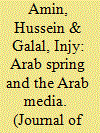

|
|
|
| 2 |
ID:
087560
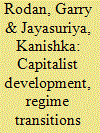

|
|
|
|
|
| Publication |
2009.
|
| Summary/Abstract |
The possibility of viable alternatives to the historical combination of liberal democracy and capitalist development is now widely acknowledged in the analysis of late industrializing countries. For example, within the transitions literature notions of hybrid regimes and closer scrutiny of institutional functioning are being employed to capture complex variations in authoritarianism. Less acknowledged is the significance of capitalist dynamics and related geopolitics for the character and performance of political institutions. We argue that late industrialization in Asia has especially militated against middle-class/labor alliances and produced a general fragmentation of social forces restricting the scope for democratic coalitions. But as well as helping to explain the consolidation and refashioning of existing authoritarian regimes, analysis of these social foundations of political institutions also helps account for strands of authoritarianism within so-called post-authoritarian polities. The Pacific Review has long fostered debate about the durability or otherwise of authoritarian regimes and alternative models to Western capitalism in Asia.
|
|
|
|
|
|
|
|
|
|
|
|
|
|
|
|
| 3 |
ID:
072986


|
|
|
|
|
| Publication |
2006.
|
| Summary/Abstract |
This article investigates the relationship between regime characteristics and the likelihood of chemical, biological, radiological, and nuclear (CBRN) terrorist incidents. Odds ratios establish that democratic ideals-democratic rule, strong rule of law, and honest regimes-are associated with more CBRN incidents. Failed states may be where some terrorist groups form or take refuge, but these states have not been the venue of choice for CBRN incidents. Religious (cults and fundamentalists) and nationalist/separatist groups are not more likely than others to engage in CBRN attacks. To date, indiscriminate CBRN attacks are as likely as discriminate attacks to cause casualties. Transnational terrorist groups are less adept than others in concealing their acquisition of CBRN substances. For some regressions, democratic rule and strong rule of law are positive determinants of CBRN incidents.
|
|
|
|
|
|
|
|
|
|
|
|
|
|
|
|
| 4 |
ID:
085860
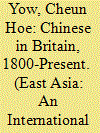

|
|
|
|
|
| Publication |
2008.
|
| Summary/Abstract |
What readers will not find in the book The Chinese in Britain. 1800-Present:Economy, Transnationalism, Identity is obsession with taking up any particular theoretical lens to scrutinize and magnify issues pertaining to the Chinese diaspora.
|
|
|
|
|
|
|
|
|
|
|
|
|
|
|
|
| 5 |
ID:
126692
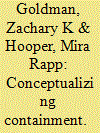

|
|
|
|
|
| Publication |
2013.
|
| Summary/Abstract |
Zachary K. Goldman and Mira Rapp-Hooper discuss American security interests in the Persian Gulf region and the prospects for effective cooperation among Gulf States to contain Iran. They ?nd that it is unlikely that the United States will be able to establish a containment regime that relies upon the Gulf Cooperation Council and that informal, bilateral ties to states in the region are a preferable policy recourse.
|
|
|
|
|
|
|
|
|
|
|
|
|
|
|
|
| 6 |
ID:
094984
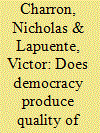

|
|
|
|
|
| Publication |
2010.
|
| Summary/Abstract |
This article analyses the effects of political regimes over state capacity or the quality of government (QoG): Do democratic states perform better than authoritarian ones? Previous studies point to a nonlinear relationship between democracy and government quality. It is argued here that QoG is a function of both forces of supply (leaders who have the power to make reforms) and demand (citizens' desire for mid- to long-term investments over short-term needs), the latter of which is a function of economic development. In democratic states, leaders have stronger incentives to improve QoG after a certain degree of wealth is reached, while in poorer countries they have little incentive for long-term bureaucratic investments. Thus it is predicted that the relationship between democracy and QoG is conditional, based on economic development. With over 125 countries in the sample, this hypothesis is tested using time-series panel data and spatial models, and strong empirical support is found.
|
|
|
|
|
|
|
|
|
|
|
|
|
|
|
|
| 7 |
ID:
145624


|
|
|
|
|
| Summary/Abstract |
The article analyzes the democratic transitions in Tunisia and Egypt, after the so-called “Arab Spring.” The working hypothesis is that the model of transition influences the result of democratization processes. The article is organized in three sections. The first one puts forward a theoretical and methodological framework, which includes a definition and classification of political regimes, a typology of the processes of political change and suggests models of democratic transition. Second, the models of transition in Tunisia and Egypt are compared in terms of four analytical dimensions: leadership of the transition, competition and interaction between political actors, consensus over the transition process, and the popular mobilization and the participation of the civil society. The third section assesses the outcomes of the research and concludes that the exclusion of political forces and the intervention of non-accountable actors can determine the result of democratic transitions (Egypt). In contrast, the agreements between political actors and the concessions of a predominant party can bring about a successful transition, even in a polarized scenario (Tunisia).
|
|
|
|
|
|
|
|
|
|
|
|
|
|
|
|
| 8 |
ID:
130878
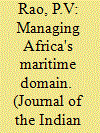

|
|
|
|
|
| Publication |
2014.
|
| Summary/Abstract |
Africa's coastal zones and ocean spaces bear certain unique features as different from those of the other zones of the Indian Ocean region. One such maritime characteristic is that the continent is virtually flanked by sea on all four sides. Such uniqueness of the region has both positive and negative consequences for the coastal countries of Africa. The adverse consequences of the maritime topography, such as piracy and illegal fishing, are rather more seriously felt by today by the regional states. The unstable and fragile political regimes of many of the African littoral countries compound the problems of managing their maritime domains. Maritime criminal and illegal operations are confined not only to the coastal states but also to the island states of the continent. The inability of these states to combat the threats regularly posed by maritime non-state actors has resulted in the enormous naval militarisation of the African waters by foreign naval forces, Western and non-Western. How far and how long the states of the region should depend on foreign countries for ensuring the safety of their coastal zones will also determine the level of independence that these states will retain to keep their maritime wealth and domain under their sovereign control.
|
|
|
|
|
|
|
|
|
|
|
|
|
|
|
|
| 9 |
ID:
107443
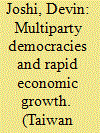

|
|
|
|
|
| Publication |
2011.
|
| Summary/Abstract |
This essay examines whether developing countries with competitive multiparty
democracies may be just as capable of sustaining rapid economic growth
as single-party states. It begins with a literature review identifying political
stability and the ability to mobilize labor and capital production inputs as key
factors behind sustained rapid growth. It then develops the hypothesis that under
certain conditions, multiparty democracies may be strong in these dimensions,
but ceteris paribus, single-party states are likely to have an advantage. I test
this hypothesis by exploring historical trends in rapid growth over the last five
decades. Statistical regression analysis confirms that most sustained highgrowth regimes have not been competitive multiparty democracies. On a more
optimistic note, however, the number of high-growth multiparty democracies
increased significantly during the period between 2000 and 2009, signaling a
possible breakthrough in the twenty-first century.
|
|
|
|
|
|
|
|
|
|
|
|
|
|
|
|
| 10 |
ID:
126693
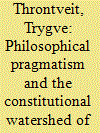

|
|
|
|
|
| Publication |
2013.
|
| Summary/Abstract |
AS THE DUST STILL SWIRLS, ENDLESSLY IT SEEMS, around the 2012 election, it is worth reexamining its predecessor of a century ago: the epochal election of 1912. Granted, 1912 was a four-way race, pitting Democratic and Republican nominees against challengers from the Socialist and Progressive Parties-a far cry from today's bipolar contests. Yet then as now, the political climate was highly charged, and the main question dividing the nation essentially the same: How should government protect freedom and promote opportunity while reducing inequality and ameliorating its effects? These general similarities suggest two particular reasons to study the course and consequences of the 1912 election. First, today's American system can be traced in important ways to its outcome, which put Woodrow Wilson in the White House after a sophisticated rhetorical battle that clarified his vision for American democracy and shaped the policies he devised to achieve it. Those policies laid the grounds for the American welfare state that emerged under Franklin D. Roosevelt, and thus mark, if not a constitutional revolution on the scale of the New Deal, a watershed: a diversion of ideological currents and institutional inertia that made subsequent changes possible. Second, both the campaign and Wilson's presidency were influenced, to an unrecognized degree, by a tradition of American philosophy that might offer intellectual resources for today's political tasks: philosophical pragmatism, a tradition popularized by William James and given explicit political content by his Progressive Era students and admirers.
|
|
|
|
|
|
|
|
|
|
|
|
|
|
|
|
| 11 |
ID:
132092
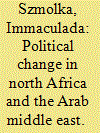

|
|
|
| 12 |
ID:
194438


|
|
|
|
|
| Summary/Abstract |
This study assesses the effectiveness of government initiatives and explores the impact of a shift in political regimes in reducing arms imports. We employ an Interrupted Time Series design using the Prais-Winsten Regression to assess the impact of India’s increased focus on achieving self-reliance in arms manufacturing with the change in political regimes in 2014. The time period analyzed is from 2004 to 2022. Our findings suggest that policies associated with the change in political regimes have succeeded in curbing arms imports. This paper offers insights into the broader implications of political regime changes on a nation’s quest for self-reliance in arms manufacturing, making it valuable for defense analysts and scholars specializing in international relations and arms trade.
|
|
|
|
|
|
|
|
|
|
|
|
|
|
|
|
| 13 |
ID:
140374
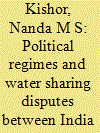

|
|
|
| 14 |
ID:
134143
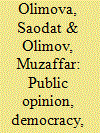

|
|
|
|
|
| Publication |
2014.
|
| Summary/Abstract |
Based on Tajikistan's experience, this article examines the evolution of views, values, and preferences of the population of the Central Asian (CA) countries that support the sustainability of their political regimes. Based on public opinion poll results, this article presents the population's preferences regarding the political system, sheds light on its attitude toward state power and its institutions, and gives assessments of the current regime and efficiency of different forms of citizen engagement. It also looks at the ways citizens participate in state governance and how effectively value judgments are being implemented.
The paper shows that despite the differences in the traditional social institutions of the CA states, as well as in the development paths they have chosen, they are all evolving according to the neopatrimonialism model. However, the evolution of political views in the CA societies shows that democratic values and preferences continue to occupy an important place in the mass consciousness. From this it follows that the government's necessitated support of certain elements of democracy is generated not only by its desire to create a façade or its willingness to make concessions to foreign donors and the international community, but also by social pressure. At the same time, the population's political views and preferences are contradictory and fragmented. They form the base for mass support of democracy, on the one hand, and for social consensus regarding restrictions of citizen rights and recognition of the privileges of heads of state, including patrimonial supremacy, on the other.
|
|
|
|
|
|
|
|
|
|
|
|
|
|
|
|
| 15 |
ID:
133664
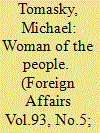

|
|
|
|
|
| Publication |
2014.
|
| Summary/Abstract |
Divisions among Democrats exist just like they do among Republicans, but have largely festered beneath the surface for lack of a spokesperson to challenge the party's economic elites. In Elizabeth Warren, grassroots Democrats may have found their champion.
|
|
|
|
|
|
|
|
|
|
|
|
|
|
|
|
|
|
|
|
|